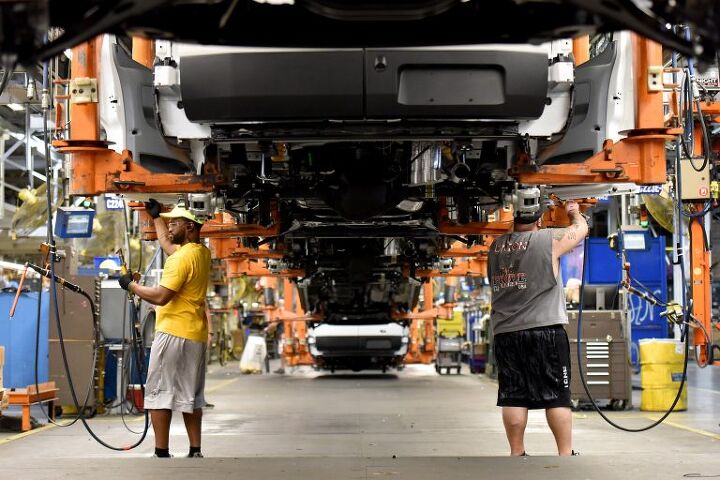Semiconductor Shortage Delays More Automobiles

The industry is having to stall more plants to contend with the semiconductor shortage that’s currently making it more difficult for you to get everything from a smartphone on up to your next vehicle. Ford Motor Co. recently informed employees that its Dearborn truck plant (easily one of its most profitable facilities) would need to be idled through the weekend to create a buffer for semiconductor chips. Worse yet, it’s not the first time the automaker has had to stall output of the F-150 this year. Ford has also started manufacturing trucks without all the necessary components, stating it would hold vehicles for a few weeks to account for supply chain delays.
Meanwhile, Chrysler has made a similar announcement about its minivan output as Windsor Assembly faces another chip deficit. Unifor Local 444 recently stated that the facility would be staring down the barrel of a four-week shutdown starting next week. Considering Chrysler’s minivans literally just dealt with a three-week stall over the chip shortage, union workers are understandably upset. Days earlier, General Motors Canada also announced that its CAMI plant in Ingersoll, Ontario, will likely remain idle until the middle of April.
But it’s been hard times for the industry in general. Following a lackluster 2020, this year started with numerous automakers confessing that the semiconductor shortage would be more impactful than they initially estimated. By February, analysts had gotten in on the action and started making varied predictions about the future. Though the present was deemed a mess by everyone and the rippling effect of lockdowns was presumably going to continue wreaking havoc on global supply chains.
“At this stage, while we anticipate a million vehicles will be delayed from production in the first quarter, we expect the industry to recover later in the year, with little expected risk to the full year forecast of 84.6 million units at this time. We are continuing to monitor, however, and the situation remains fluid,” stated Executive Director of Global Light Vehicle Production for IHS Markit Mark Fulthorpe.
While the IHS Markit analysis from last month is probably one of the more nuanced takes on the chip shortage, it doesn’t paint the rosiest of pictures. It suggests prolonged hardships affecting all manufacturers, with a late-year turnaround, allowing for the possibility of things getting much worse on the chip front through the second quarter. Asian firms appear to be better positioned than their Western counterparts, however, it’s becoming increasingly obvious that no manufacturer will emerge unscathed.
Ford’s latest action lends itself to a previous forecast that the chip shortage could burn roughly $1 billion to $2.5 billion off this year’s estimated profit. Considering that the automaker stalled numerous facilities since the start of 2021 (often impacting the all-important F-Series), we’re willing to believe those figures.
Blue Oval plans on having Dearborn closed from Friday through Sunday, though it’s not just the F-150 being impacted. The automaker has had to slow production of the Transit, Escape, EcoSport, and Edge. While other models have also been impacted, Ford claims those shorts represented negligible production losses.
GM’s latest announcement impacts Chevrolet Equinox production. But the company has also confirmed output will be suppressed for the Chevy Colorado and GMC Canyon (starting on Monday) due to stalls at Wentzville Assembly Center until April 5th. Lansing Grand River Assembly has also seen closures extended through April 12th, impacting volume for the Camaro and Cadillac’s sedans.
[Images: Ford Motor Co.]

A staunch consumer advocate tracking industry trends and regulation. Before joining TTAC, Matt spent a decade working for marketing and research firms based in NYC. Clients included several of the world’s largest automakers, global tire brands, and aftermarket part suppliers. Dissatisfied with the corporate world and resentful of having to wear suits everyday, he pivoted to writing about cars. Since then, that man has become an ardent supporter of the right-to-repair movement, been interviewed on the auto industry by national radio broadcasts, driven more rental cars than anyone ever should, participated in amateur rallying events, and received the requisite minimum training as sanctioned by the SCCA. Handy with a wrench, Matt grew up surrounded by Detroit auto workers and managed to get a pizza delivery job before he was legally eligible. He later found himself driving box trucks through Manhattan, guaranteeing future sympathy for actual truckers. He continues to conduct research pertaining to the automotive sector as an independent contractor and has since moved back to his native Michigan, closer to where the cars are born. A contrarian, Matt claims to prefer understeer — stating that front and all-wheel drive vehicles cater best to his driving style.
More by Matt Posky
Latest Car Reviews
Read moreLatest Product Reviews
Read moreRecent Comments
- ToolGuy If these guys opened a hotel outside Cincinnati I would go there to sleep, and to dream.
- ToolGuy Michelin's price increases mean that my relationship with them as a customer is not sustainable. 🙁
- Kwik_Shift_Pro4X I wonder if Fiat would pull off old world Italian charm full of well intentioned stereotypes.
- Chelsea I actually used to work for this guy
- SaulTigh Saw my first Cybertruck last weekend. Looked like a kit car...not an even panel to be seen.



































Comments
Join the conversation
The prices will continue to go up on new vehicles especially with this chip shortage and used vehicles will go up as well. Add the stimulus payments along with workers who took mass transit that have been buying vehicles to commute and the demand for vehicles will increase.
Finally, more of this TTAC.. make yourself useful for goodness sake, less drivel please